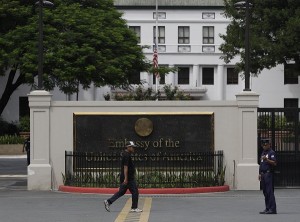US to deploy drones at PH’s request only — US embassy
MANILA, Philippines — The United States military would deploy its drones to assist in aerial surveillance for humanitarian and search and rescue purposes only at the request of the Philippine government, US Embassy officials in Manila said on Thursday.
This following revelations of Davao City Mayor Rodrigo Duterte that the US had sought permission to use his city’s old airport as the base for operations of its drones, a request he denied saying he did not want any further security problem in his turf.
In a statement sent to the Philippine Daily Inquirer, US Embassy officials said its military would deploy unmanned aerial vehicles only if the Philippine government sought such assistance.
“At the request of the Philippine government, the US military has provided aerial surveillance using small unarmed, unmanned aerial vehicles (UAVs) to support activities such as topographical analysis and safety estimates,” said the Embassy.
Officials did not directly comment on Duterte’s remarks but said drone operations would be limited to providing aerial reconnaissance in the event of humanitarian emergency or urgent search and rescue missions.
Article continues after this advertisementPrevious deployments include support for an aerial survey of the devastation in the wake of deadly Typhoon Pablo, which killed more than 1,100 people across Mindanao in December last year.
Article continues after this advertisementUS drones were also dispatched to scan the waters off Masbate to locate the ill-fated plane that carried the late Jesse Robredo a year ago.
“When requested by the AFP (Armed Forces of the Philippines), the U.S. military provides aerial surveillance assistance to support the AFP. For example, such information has helped the Philippines safely perform missions such as humanitarian assistance in the case of floods or other natural disasters, or rescue and recovery operations,” said Embassy officials.
Duterte spoke about the US request amid a simmering debate on negotiations for greater access of the US military to the country’s bases, a prospect that the Philippine government deems imperative as it beefed up external defense amid security concerns in the region.
Negotiations between the Philippines and the US, its closest defense ally, began this week in Manila. Officials of the Departments of Defense and of Foreign Affairs have assured the public that any base access agreement would be made within the bounds of the Constitution and standing Philippine-US cooperation pacts.
Foreign Affairs Secretary Albert del Rosario confirmed earlier this month that the US has been providing intelligence assistance to the Philippines through the deployment of P-3C Orions (maritime surveillance aircraft) over the disputed West Philippine Sea (South China Sea) as part of regular joint military exercises.
“The US government wants to use the old airport. I refused. I will not allow them to use our airport for them to launch their drones,” Duterte said Monday during a gathering of some 150 Muslim volunteers tapped to help the local government secure Davao City.
Duterte also shared that US government representatives also made the same request to his daughter Sara when she was still mayor.
“I do not want it. I do not want trouble and killings,” Duterte said.
He said he told the US government that there would be more bloodshed if there were drone operators in the city: “They will only add to the problem.”
The Mayor believes the US has been undertaking covert operations in Davao City, citing the case of one Michael Meiring, an American who was injured in a mysterious explosion in his hotel room on May 16, 2002. Investigation later found the bomb belonged to Meiring himself.
Agents believed to be from the US Federal Bureau of Investigation allegedly snuck Meiring out of the hospital where he was undergoing treatment, evading local security forces. The mayor believes he was transported to the US through Singapore.
Duterte said he would open to talk with the US but that he would still rejecting the request.
